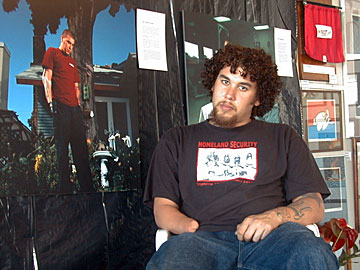
ROD THOMPSON / RTHOMPSON@STARBULLETIN.COM
Iraq war veteran Robert Acosta, visiting Hilo, sits in front of a portrait taken by photographer Nina Berman shortly after he left Walter Reed Army Medical Center. Acosta stopped using prosthetic arms because they all broke.
|
|
Amputee telling war story on Big Isle tour
Featured in a book on vets, he travels to help raise awareness
HILO » Robert Acosta looked straight into the eyes of the man who threw a grenade at him from only six feet away.
The Iraq war veteran did not see the grenade until it landed inside his Humvee at his feet. He was reaching for it when it went off, ripping his left leg and blowing off his right hand.
Acosta, 22, from Orange County, Calif., is on the Big Island this week with award-winning New York photographer Nina Berman to talk about and show the lives of Americans wounded in Iraq.
In 1986, traveling with a dozen former U.S. troops returning to Vietnam, Berman saw the consequences of war continuing for survivors.
"I saw these veterans laying their emotional wounds right out in the open. It was raw and it was rough," she said. Later she photographed rape victims in Bosnia and women under the Taliban in Afghanistan.
Preparing a photo book on Americans wounded in Iraq called "Purple Hearts," she became friends with Acosta, "the smartest and most aware" of the veterans she met. They began speaking across the country and abroad, including Germany.
Acosta grew up in a good home with a brother and a sister, his father working in construction, his mother a housewife. But he dropped out of high school and was using methamphetamine. In 2001, before the Twin Towers attack in New York, he met an Army recruiter. "It was just a way out," he said of his decision to enlist.
In 2003 his unit, the 1st Armored Division, was sent to Kuwait and from there invaded Iraq.
On July 13, 2003, he looked into the eyes of his would-be killer. He shouted, "Grenade," but it was too late.
"There was blood all over the windows. I was in a zone. I wasn't really there," he said.
Now, when he talks to high school kids, they want to know what it was like. That is the point, Berman said.
Television reports show funerals of Americans killed in Iraq, but the dead cannot talk. Only the survivors can tell their stories, she said.
Acosta and Berman do not comment on any party or any public official. But to anyone whose car has a yellow ribbon urging support of the troops, they ask whether the owner voted for a member of Congress who voted against money for veterans.
While casualties have risen, Congress has cut benefits for veterans, Berman said.
Acosta has several prosthetic arms, he said. Like many veterans, he had to use duct tape to hold them in place. They all broke so he stopped using them.
Acosta and others once explained their problems to a mainland congressman, who replied point-blank, "I don't believe you."
Some wounded veterans are desperate, Acosta said. "They have to really, really try not to flip out," he said.

